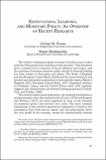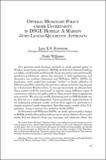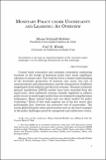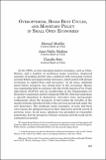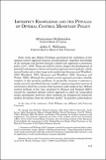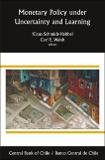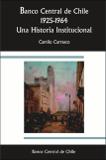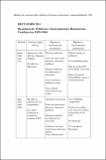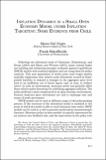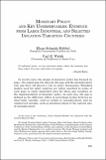Buscar
Mostrando ítems 1-10 de 16
Expectations, learning and monetary policy: an overview of recent research
The conduct of monetary policy in terms of interest rate or other rules has been extensively studied in recent research. This literature gives a central role to forecasts of future inflation and output, and the question of whether monetary policy should be forward- ooking has been subject to discussion ...
Optimal monetary policy under uncertainty in DSGE models: a markov jump-linear-quadratic approach
Our previous work develops methods to study optimal policy in Markov jump-linear-quadratic (MJLQ) models with forward-looking variables: models with conditionally linear dynamics and conditionally quadratic preferences, where the matrices in both preferences and dynamics are random (Svensson and ...
Monetary policy under uncertainty and learning: an overview
Central bank economists and academic economists conducting research on the design of monetary policy have made significant advances in recent years. This work has led to a clearer understanding of the desirable properties of interest rate rules, the role of announcements and communication, and the ...
Overoptimism boom-bust cycles and monetary policy in small open economies
In the 1990s several emerging market economies such as Chile Mexico and a number of southeast Asian countries displayed episodes of peaking growth rates combined with increasing current account deficits and appreciating currencies which ended with abrupt reversions in capital flows and recessions. In ...
Imperfect knowledge and the pitfalls of optimal control monetary policy
Sixty years ago, Milton Friedman questioned the usefulness of the optimal control approach because of policymakers’ imperfect knowledge of the economy and favored instead a simple rule approach to monetary policy (1947, 1948). These are still live issues, despite the development of powerful techniques ...
Monetary policy under uncertainty and learning
Huge swings in oil, food, and other commodity prices and the global financial crisis are at the core of current monetary policy discussion. The latter events are vivid reminders of how uncertainty, imperfect knowledge, and the need to learn affect macroeconomic behavior and the conduct of monetary ...
Banco Central de Chile 1925-1964: una historia institucional
La historia monetaria de Chile en el siglo XX es reconocidamente interesante y ha sido objeto de numerosos estudios. Con todo, el principal ente emisor de dinero no disponía de una historia institucional que pudiese contribuir con nuevos elementos para explicar algunos de los fenómenos monetarios y ...
Inflation dynamics in a small open economy model under inflation targeting: some evidence from Chile
Following the influential work of Christiano, Eichenbaum, and Evans (2005) and Smets and Wouters (2003), many central banks are building and estimating dynamic stochastic general equilibrium (DSGE) models with nominal rigidities and are using them for policy analysis. This new generation of sticky ...
Monetary policy and key unobservables: evidence from large industrial and selected inflation-targeting countries
In recent years, the design of monetary policy has focused on gaps—the output gap, the interest rate gap, and the unemployment rate gap have all played a role in policy discussions. Standard models used for policy analysis are either specified in terms of such gaps or imply important roles for these ...

